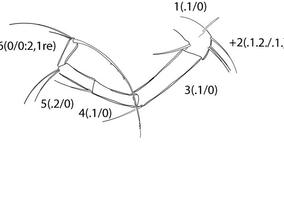You are here
Taxon Pages
Macroscapha falcis Brandão, 2010
Nomenclature
-
Family: MacrocyprididaeGenus: Macroscapha
SUMMARY
Carapace large (for the genus); lateral outline subtrapezoidal, slightly sinuous, rectilinear; dorsal angle quite conspicuous; posterodorsal margin of LV conspicuously sinuous; posterior angle acute in RV, more obliquely rounded in LV; ventral margin slightly sinuous; anterior margin narrowly rounded. Vestibules wide; zone of concrescence fairly narrow; radial pore canals straight. In all specimens studied herein, LV larger than, and overlapping, RV anterodorsally, posterodorsally, and ventrally. Females higher in relation to length than males.
Antennula and antenna with slender podomeres and setae. Podomeres II and III of antennula fused, no suture visible. Length of podomere IV of antenna less than two times length of podomere III. Exopodite of mandibula with one reduced and seven medium sized setae. Vibratory plate of maxillula with one short and two long strahlen plus around 15 feathered setae, basal endite with two ventral setae; other endites without basal setae. Exopodite of fifth limb with three proximal setae and seven distal setae; podomere V of female fifth limb (= palp podomere IV) with short and thick terminal claws, dorsal one shortest, medial and dorsal ones long, subequal. Male fifth limb very asymmetrical, right appendage with one very long, and thick modified seta (= peg), plus one short, modified seta (= peg), and one short, simple seta on podomere II (palp podomere I); podomere III smoothly curved; left appendage with two short, modified setae (= pegs), and one short, simple seta on podomere II (palp podomere I); podomere III pointed at 90°. Podomere VI of sixth limb with one very short and one short setae, and one long claw. Furca with barbed, symmetrical, with thick rods; terminal setae thick and short; slight suture between terminal setae and rods. Male copulatory limb very high in relation to length and strongly curved; copulatory process trisegmented, proximal element thick, robust, rod-shaped; weakly sclerotized, large, irregularly shaped medium element; and a hook-shaped terminal element, distal tip of posterior ramus of hook sinuous. Zenker’s organ with robust central tube and medium-sized terminal bulb; vas deferens arranged in few loops, which are shorter than the length of the chitinous tube.






